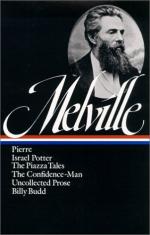In this last voyage, our adventurer experienced to the extreme all the hardships and privations of the whaleman’s life on a long voyage to distant and barbarous waters—hardships and privations unknown at the present day, when science has so greatly contributed, in manifold ways, to lessen the sufferings, and add to the comforts of seafaring men. Heartily sick of the ocean, and longing once more for the bush, Israel, upon receiving his discharge at Nantucket at the end of the voyage, hied straight back for his mountain home.
But if hopes of his sweetheart winged his returning flight, such hopes were not destined to be crowned with fruition. The dear, false girl was another’s.
CHAPTER III.
Israel goes to the wars; and reaching Bunker hill in time to be of service there, soon after is forced to extend his travels across the sea into the enemy’s land.
Left to idle lamentations, Israel might now have planted deep furrows in his brow. But stifling his pain, he chose rather to plough, than be ploughed. Farming weans man from his sorrows. That tranquil pursuit tolerates nothing but tranquil meditations. There, too, in mother earth, you may plant and reap; not, as in other things, plant and see the planting torn up by the roots. But if wandering in the wilderness, and wandering upon the waters, if felling trees, and hunting, and shipwreck, and fighting with whales, and all his other strange adventures, had not as yet cured poor Israel of his now hopeless passion, events were at hand for ever to drown it.
It was the year 1774. The difficulties long pending between the colonies and England were arriving at their crisis. Hostilities were certain. The Americans were preparing themselves. Companies were formed in most of the New England towns, whose members, receiving the name of minute-men, stood ready to march anywhere at a minute’s warning. Israel, for the last eight months, sojourning as a laborer on a farm in Windsor, enrolled himself in the regiment of Colonel John Patterson of Lenox, afterwards General Patterson.
The battle of Lexington was fought on the 18th of April, 1775; news of it arrived in the county of Berkshire on the 20th about noon. The next morning at sunrise, Israel swung his knapsack, shouldered his musket, and, with Patterson’s regiment, was on the march, quickstep, towards Boston.
Like Putnam, Israel received the stirring tidings at the plough. But although not less willing than Putnam to fly to battle at an instant’s notice, yet—only half an acre of the field remaining to be finished—he whipped up his team and finished it. Before hastening to one duty, he would not leave a prior one undone; and ere helping to whip the British, for a little practice’ sake, he applied the gad to his oxen. From the field of the farmer, he rushed to that of the soldier, mingling his blood with his sweat. While we revel in broadcloth, let us not forget what we owe to linsey-woolsey.




